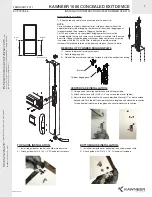
Basics of program execution
7.2 CPU overload behavior
Distributed I/O system
System Manual, 12/2016, A5E03576849-AG
153
7.2
CPU overload behavior
Requirement
For the event scenarios considered in the following section, we assume that you have
assigned an OB to each event source and that these OBs have the same priority. The
second condition, in particular, is only for the sake of a simplified representation.
Principle of CPU overload behavior
An occurring event triggers the execution of the associated OB. Depending on the OB
priority and the current processor load, a time delay may occur before the OB is executed
when there is an overload. The same event can therefore occur once or several times before
the user program processes the OB belonging to the preceding event. The CPU treats such
a situation as follows: The operating system positions the events in the order of their
occurrence into the queue for their priority level.
To cope with temporary overload situations, you can limit the number of pending events
originating from one and the same source. The next event is discarded as soon as the
maximum number of pending start events of a specific cyclic interrupt OB, for example, is
reached.
An overload occurs when events which originate from the same source occur faster than
they can be processed by the CPU.
More detailed information is available in the following sections.
Summary of Contents for Simantic ET200SP
Page 1: ......
















































